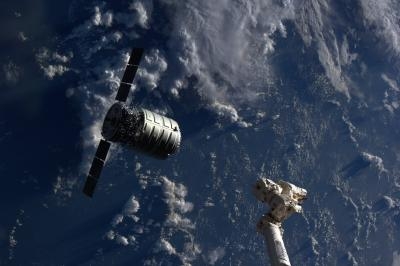Thu, Dec 19, 2013
Sets Spacewalks To Repair Faulty Station Pump Module
NASA managers are postponing the upcoming Orbital Sciences commercial cargo resupply mission to the International Space Station to proceed with a series of spacewalks to replace a faulty pump module on the space station. Orbital Sciences' Cygnus spacecraft, atop its Antares rocket, now will launch no earlier than January. The postponement of the Antares launch will allow ample time for the station crew to focus on repairing a faulty pump module that stopped working properly on Dec. 11.

NASA currently plans for two Expedition 38 astronauts to venture outside the space station Dec. 21, 23 and 25. NASA astronauts Rick Mastracchio and Mike Hopkins will remove a pump module that has a failed valve. They will replace it with an existing spare that is stored on an external stowage platform. The pump is associated with one of the station's two external cooling loops, which circulate ammonia outside the station to keep both internal and external equipment cool.
Each of the three spacewalks will begin at 0710 EST. and is scheduled to last six and a half hours.
Then the Orbital mission launches, the profile calls for a two-stage Antares space launch vehicle utilizing a liquid-fueled first stage powered by two Aerojet Rocketdyne AJ26 engines and a solid motor ATK CASTOR 30B upper stage to boost Cygnus into orbit. The powered launch sequence will last about ten minutes from liftoff through the separation of Cygnus from the launch vehicle.
After separation from Antares, Cygnus will deploy its solar arrays and undergo initial check-out. The spacecraft will conduct a series of thruster burns to raise its orbit to bring it within 4 km of the ISS prior to receiving authorization to autonomously rendezvous with the station. When the vehicle approaches to within 12 meters, the astronauts will use the station’s robotic arm to grapple Cygnus and berth it to the Harmony node of the station. Cygnus is planned to remain berthed at the ISS for 42 days during which time the station crew will load Cygnus with materials for disposal. At the end of the mission Cygnus will depart the station and reenter the Earth’s atmosphere.
(NASA image of Cygnus spacecraft on previous mission to ISS)
More News
Also: Vertical Flight Society, NBAA Maintenance Conference, GA Honored, AMT Scholarship For the first time, students from Embry-Riddle’s Daytona Beach, Florida, campus took t>[...]
Hazardous Weather Information Summary of significant meteorological information (SIGMET/WS), convective significant meteorological information (convective SIGMET/WST), urgent pilot>[...]
"The need for innovation at speed and scale is greater than ever. The X-62A VISTA is a crucial platform in our efforts to develop, test and integrate AI, as well as to establish AI>[...]
(FAA) Inspector Observed That Both Fuel Tanks Were Intact And That Only A Minimal Amount Of Fuel Remained In Each Analysis: According to the pilot, approximately 8 miles from the d>[...]
“Pyka’s Pelican Cargo is unlike any other UAS solution on the market for contested logistics. We assessed a number of leading capabilities and concluded that the Pelica>[...]
 Airborne-Flight Training 05.09.24: ERAU at AIAA, LIFT Diamond Buy, Epic A&P
Airborne-Flight Training 05.09.24: ERAU at AIAA, LIFT Diamond Buy, Epic A&P ANN's Daily Aero-Term (05.07.24): Hazardous Weather Information
ANN's Daily Aero-Term (05.07.24): Hazardous Weather Information Aero-News: Quote of the Day (05.07.24)
Aero-News: Quote of the Day (05.07.24) NTSB Final Report: Cessna 150
NTSB Final Report: Cessna 150 Aero-News: Quote of the Day (05.08.24)
Aero-News: Quote of the Day (05.08.24)



